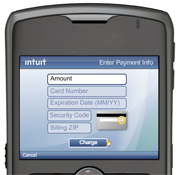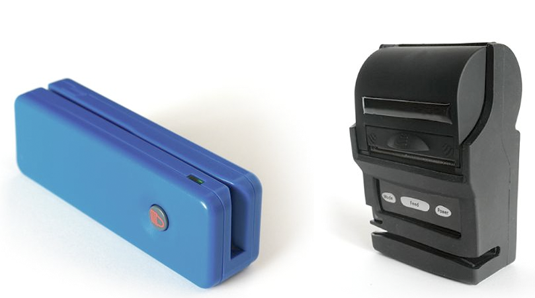And here’s another new piece of mine elsewhere: My look at QuickBooks 2012 for AllBusiness.com. (No, I’m not a financial software expert–just a small business person who doesn’t like accounting but can’t avoid it.)
Tag Archives | Intuit
The New Quicken is Minty Fresh
You don’t often hear a tech exec responsible for a product say that he hates anything about it, but Intuit’s Aaron Patzer is a special case–his dislike of Quicken spurred him to found the excellent online finance site Mint. When Intuit bought Mint last year, Patzer ended being responsible for both Mint and Quicken. The new version of Quicken, Quicken 2011, is the first one to reflect his influence, and it certainly shows the influence of the more modern Mint.
6 comments
Intuit Does Customer Management for Small Business
![]() As much as any major software company around, financial mainstay Intuit is in the ongoing process of reinventing itself for the Web. So it makes sense that its newest small-business offering is debuting as a Web service; Customer Manager is a little-company version of what big companies call Customer Response Management (CRM): A suite of tools for keeping track of your relationships with the companies who do business with you. It’s a browser-based, customizable, shared database of customer information that syncs with Intuit’s QuickBooks–you can see recent financial transactions, for instance–and can import and export information from Outlook and Exchange.
As much as any major software company around, financial mainstay Intuit is in the ongoing process of reinventing itself for the Web. So it makes sense that its newest small-business offering is debuting as a Web service; Customer Manager is a little-company version of what big companies call Customer Response Management (CRM): A suite of tools for keeping track of your relationships with the companies who do business with you. It’s a browser-based, customizable, shared database of customer information that syncs with Intuit’s QuickBooks–you can see recent financial transactions, for instance–and can import and export information from Outlook and Exchange.
Customer Manager also has a shared calendar and to-do list; there’s also a BlackBerry version, with editions for other smartphones on the way.
Judging from the demo Intuit gave me, the whole shebang aims for basic features and simplicity rather super-sophisicated stuff. Which may make sense for the target customers: Small businesses who are still juggling data about customers using Excel, if they’re doing it at all. The price is right, too: $9.95 a month for up to five users.

So much of small-business America’s customer info is already stored in QuickBooks that Customer Manager feels more like a logical extension of what Intuit’s already up to than a brave new frontier. I asked Product Manager John Flora if we’d see the company branch out more with additional services for Web-savvy smaller companies. Yup, he said, we would. The world of QuickBooks is still fairly desktop-centric–the online version doesn’t try to replicate the desktop ones–and it’ll be interesting to see if it follows Quicken’s current fast-forward move to the Web.
8 comments
More Details About the Intuit-Mint Deal: Quicken Online to Get Mint-ized
 I just spoke with Aaron Patzer, founder of Mint and general-manager-to-be of Intuit’s personal finance group, about Intuit’s planned $170 million acquisition of Mint and what it means for consumers. A few notes from our discussion on what’s in the works, assuming the merger goes off as planned:
I just spoke with Aaron Patzer, founder of Mint and general-manager-to-be of Intuit’s personal finance group, about Intuit’s planned $170 million acquisition of Mint and what it means for consumers. A few notes from our discussion on what’s in the works, assuming the merger goes off as planned:
Quicken Online will become a reskinned Mint. It doesn’t make sense for one company to have two Web-based personal-finance services that, while far from identical, are trying to do similar things. The battle between Quicken Online and Mint will end, and it’s Mint that will be the victor: The Quicken Online service will be pretty much the same service as today’s Mint except with Quicken’s red-and-white color scheme, Patzer told me. Current Quicken Online users should see their transactions move into the Mint-powered version, and Patzer hopes that other items such as categories will also be able to make the transition. Why not just kill Quicken Online? Patzer says the Quicken brand name is so familiar that it makes sense for Mint to adapt its identity as well as to keep its own moniker.
Mint features will migrate into Quicken’s desktop software. One core aspect of Mint from the start (and a major part of its business model) has been the way it analyzes your financial life and attempts to recommend offers that make sense for you, such as credit cards and mortgage refinancing deals with lower interest rates. Patzer says the plan is to bring some of this stuff into Quicken’s traditional software version, too.
Quicken desktop isn’t going anywhere. At the moment, it has more advanced features than either Mint or Quicken Online in some areas, such as investments and tax handling. Patzer says Quicken users tend to be older than Mint’s customers (in their 40s and 50s vs. 20s and 30s) and like the security of keeping their financial details local rather than stored on distant servers. So even as Mint and Quicken Online get more sophisticated, there will be a need for Quicken in software form.
Mint will take advantage of Intuit’s back-end. Intuit has a deep portfolio of technologies and partnerships in the areas of online billpay, banking, and the like. Patzer says this should let Mint become a more transactional service–instead of just seeing that a bill is due for payment, you might be able to pay it right inside of Mint.
Mint and TurboTax will meld. You’ll be able to push all the things Mint knows about your financial status, such as gains and losses, into TurboTax Patzer thinks this could dramatically reduce the drudgery of tax time.
Patzer says he knows that some Mint fans are apprehensive about the acquisition, but that they needn’t worry–especially since the Mint management and engineering team will “take a leadership role” in the combined companies.
In other news, he told me that Mint has submitted a new version of its iPhone application to Apple’s App Store. Among the changes: a PIN for added security, push notifications for stuff like bills that are due, and a slicker look.
5 comments
Mintuit: It’s Official
 The TechCrunch story from last night was solid: The first major news at the TechCrunch50 conference this morning was that Intuit is indeed buying personal-finance service Mint for $170 million. Mint founder Aaron Patzer appeared onstage to confirm the acquisition. He also said that the Mint team will be responsible not only for Mint but for the existing Quicken Online service…and the Quicken desktop software. Which might help assuage the fears of Mint fans who are worrying that Intuit will ruin it.
The TechCrunch story from last night was solid: The first major news at the TechCrunch50 conference this morning was that Intuit is indeed buying personal-finance service Mint for $170 million. Mint founder Aaron Patzer appeared onstage to confirm the acquisition. He also said that the Mint team will be responsible not only for Mint but for the existing Quicken Online service…and the Quicken desktop software. Which might help assuage the fears of Mint fans who are worrying that Intuit will ruin it.
It’ll be fascinating to see how Quicken, Quicken Online, and Mint relate to each other once all this is sorted out…
More TechCrunch50 news to come today and tomorrow–some here, and more at my Twitter feed.
4 comments
Intuit Buying Mint?
 TechCrunch’s Michael Arrington is reporting that personal-finance behemoth Intuit is about to buy Mint, the nifty financial site that has provided stiff competition (as well as inspiration) for Intuit’s Quicken Online. The timing of the report is intriguing: We’re hours away from the start of Arrington’s TechCrunch50 conference, at which Mint deservedly won best of show in the conference’s inaugural edition two years ago.
TechCrunch’s Michael Arrington is reporting that personal-finance behemoth Intuit is about to buy Mint, the nifty financial site that has provided stiff competition (as well as inspiration) for Intuit’s Quicken Online. The timing of the report is intriguing: We’re hours away from the start of Arrington’s TechCrunch50 conference, at which Mint deservedly won best of show in the conference’s inaugural edition two years ago.
If the story’s true, it makes sense: Intuit has been scrambling to play catch-up with Mint. The current version of Quicken Online is less rich than the Quicken application, and more focused on folks who want to make sure they have enough money to get through the month, not those thinking about the long haul. But you gotta think that Intuit wants its Web-based tools to be at least as rich and popular as its traditional ones, and that it knows it can’t wait very long to get there. Owning Mint would bring both some cool features and a lot of customers to Intuit.
Would Intuit kill the current Quicken Online and redub Mint with that name? Keep the two services but use the same underlying technology? Use Mint as the primary brand for online personal finance? I have no idea, but it’ll be fun to watch if the deal does go down.
Speaking of TechCrunch50, I’ll be spending much of the next two days at the conference. Stay tuned for live reports on the most interesting stuff that debuts there…
3 comments
Intuit Turns Phones Into Credit Card Terminals
 Ever do business with a mobile service provider such as a plumber or electrician who doesn’t accept credit cards, or tries to convince you to write a check instead? Isn’t it annoying? Intuit aims to make accepting credit cards on the go simpler and more affordable with GoPayment, a service it soft-launched a few months ago and formally announced today.
Ever do business with a mobile service provider such as a plumber or electrician who doesn’t accept credit cards, or tries to convince you to write a check instead? Isn’t it annoying? Intuit aims to make accepting credit cards on the go simpler and more affordable with GoPayment, a service it soft-launched a few months ago and formally announced today.
The notion of using a cell phone as a mobile credit card terminal isn’t new–here’s an iPhone app that accomplishes it. But Intuit says it’s most important to support the phones that mobile service company employees use in the real world–which tend to be flip models rather than the latest smartphones. So it offers a Web version of GoPayment that can work on any phone with a browser, and the list of phones it’s supporting with a slicker downloadable application version of GoPayment includes the Razr and various other flip phones (and the BlackBerry Curve) but not the iPhone. (I asked Intuit if it plans to launch an iPhone version, and the company wasn’t willing to say it was working on one…but it did acknowledge that it was logical to support popular phones, and the iPhone is, indeed, popular.)
Small businesses can use GoPayment without additional hardware by tapping out credit-card information on a phone’s keypad, but that’s kind of clunky and introduces the possibility of error, and receipts must be hand-written or sent via e-mail (GoPayment can do the latter automatically). So Intuit offers an optional Bluetooth card swiper for $145 and a Bluetooth swiper/printer for $219. Both are a lot cheaper than standalone wireless card terminals.

Intuit says that its transaction fees for businesses that use GoPayment, which start at 1.64% for transactions that involve a swiped card and 2.44% for ones tapped in on a phone, are competitive with other card-processing options. Oh, and it almost goes without saying that GoPayment offers integration with QuickBooks to get transactions on the books (Intuit told me that half of GoPayment customers are also QuickBook users).
Looks slick and useful–and I’ll be interested to see if any service company shows up at my house with GoPayment any time soon.
6 comments
Quicken for iPhone: Good, as Far as It Goes
![]() Intuit, the company whose Quicken has been synonymous with personal-finance management for years, has brought the app to the iPhone. It’s not the first version of Quicken for handheld devices–I used an earlier one on my PalmPilot years ago–but it’s the first modern one. And as its name, Quicken Online Mobile, suggests, it connects directly to the Net to grab your financial details rather than making you sync with the desktop app.
Intuit, the company whose Quicken has been synonymous with personal-finance management for years, has brought the app to the iPhone. It’s not the first version of Quicken for handheld devices–I used an earlier one on my PalmPilot years ago–but it’s the first modern one. And as its name, Quicken Online Mobile, suggests, it connects directly to the Net to grab your financial details rather than making you sync with the desktop app.
Actually, it doesn’t work with the traditional application version of Quicken at all–it’s a companion to Quicken Online, the Web-based version which relaunched in a free version last fall. If you’re like me, you tend to associate use of Quicken with personal-finance nerds who have their acts together, track everything carefully, and are on the road to a happy and prosperous retirement. Quicken Online isn’t aimed at those people: It’s got relatively few features, is heavy on automation (like Mint, it downloads transactions from your banks and credit-card companies automatically), and most of what it does is focused on making sure that you’ve got enough money to get to your next paycheck. Quicken Online Mobile brings that approach to the iPhone and iPod Touch, and does a nice job at it. You can see what you’ve spent and what you’ve made, and the home screen tallies everything up and tells you whether you’re in any risk of running out of dough.
14 comments
5Words for February 24th, 2009
 Did you notice Gmail’s outage?
Did you notice Gmail’s outage?
Intuit: We weren’t bullying Mint.
Vudu sells high-definition movies.
Microsoft retracts layoff-payback demand.
Most iPhone apps quickly bore.
One comment
5Words for February 20th, 2009
 Let’s get newsy, shall we?
Let’s get newsy, shall we?
Found: Atlantis. In Google Earth!
Intuit questions Mint user claims.
Greeeeaaaaat: Conficker worm variant appears.
Pirate Bay: YouTube pirates more.
Senior citizen shoots analog TV.
NetFlix may offer streaming subscriptions.
Asus might make Android netbooks.

